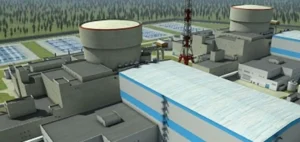EDF is going through a “serious crisis” with the unavailability of the French nuclear park, judged Wednesday Luc Rémont, prospective head of the energy company and who calls for an “essential collective effort” of energy sobriety to pass the winter.
The context is “critical in the short term”, judged in front of the commission of economic affairs of the Senate the current person in charge of the international operations of Schneider Electric, that the Elysée wants to install at the head of the weakened giant.
He is to succeed Jean-Bernard Lévy, at the helm since 2014, whose early departure was announced this summer at the same time as the renationalization of EDF, which will also unveil its quarterly results Thursday.
“Energy has now become a weapon used by Russia to weaken our societies and divide the European Union,” warned Luc Rémont.
“In this context of energy crisis, EDF itself is going through a serious crisis, both technical and industrial, which increases the tension on the energy supply,” he said.
Half of the French nuclear fleet is currently unavailable due to scheduled maintenance or problems with micro-cracks that appeared last winter.
The challenge will be to restart enough reactors to cope with peak demand.
“From the very first hours of his mandate,” Mr. Rémont plans to devote himself “totally” to “fulfilling the company’s commitments to resume production at shutdown reactors.”
But in any case, a “collective effort is essential to alleviate demand and reduce the risk of load shedding this winter and beyond,” he said.
“10% to 15% of sobriety is a goal that is painless” and “30% to 50% is not out of reach” with “an effort especially in the professional areas”, he estimated.
The financial situation of EDF, whose debt could swell to 60 billion euros by the end of the year, requires “vigilance in the short term so as not to have to reduce investments and compromise the future,” he said.
If this situation “were to improve” with the restarting of nuclear reactors, Mr. Rémont deemed necessary a “long-term visibility” on the regulatory measures intended to limit the increase in the price of electricity for customers for whom EDF bears the majority of the costs.
He also called for a “profound” reform of both European and national market rules to correct “failures highlighted by the current crisis”.
The regulated access to historical nuclear electricity (Arenh) is also “at the end of its rope”: “the objective, which was to create a real competition, is not reached”, the leader decided.






















